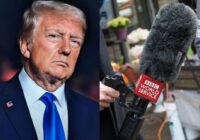Democracy is on the decline. In 2018, the Freedom in the World report published by Freedom House recorded the 12th consecutive year of retreating global freedom. This included established democracies like the United States as well as authoritarian countries such as China and Russia.
In the US, the situation is particularly worrying as a populist president appears to be damaging the country’s democracy through his divisive rhetoric, his contempt for the rule of law and his fiery attacks on the media and his critics. President Donald Trump’s incendiary language and his aggressive comments about immigrants, Muslims and Mexicans have emboldened white nationalists. Law enforcement authorities have warned about the nationwide rise of crimes linked to white supremacy.
Some of Trump’s most outspoken critics, including the 2020 presidential hopeful Bernie Sanders, have called the president a “racist” and blamed him for the uptick in violence across the country. A Quinnipiac University poll published in late July found that a majority of voters, 51%, believe that President Trump is racist. The number of African American voters who agreed was far higher: 80%.
The president, however, considers himself to be the “least racist person” in the world. He recently told reporters, “What I’ve done for African Americans in two and a half years, no president has been able to do anything like it.”
Henry Giroux is a prominent American-Canadian cultural critic and public intellectual. He is one of the founding theorists of critical pedagogy in the US. His latest book is called “The Terror of the Unforeseen.”
In this edition of The Interview, Fair Observer talks to Professor Giroux about the challenges faced by US democracy, President Trump’s immigration policies and his administration’s crackdown on education.
The transcript has been edited for clarity.
Kourosh Ziabari: In a tweet on June 16, President Donald Trump suggested that his supporters may want him to stay longer than two terms in the White House. It wasn’t the first time that he has raised the question of extending his presidential terms in violation of the 22nd Amendment of the US Constitution. Do you think he will be successful in realizing this dream? What does this proposal tell us about Trump’s worldview?
Henry Giroux: The issue is not whether he will be successful, but what the statement suggests is about Trump’s embrace of anti-democratic and authoritarian principles. He has made it clear that he views the Constitution as an impediment to his mode of authoritarian governance and, at the same time, he is feeding bait to elements of his right-wing fascist base suggesting that he may resort to violence in order to impose martial law and refuse to step down if he loses the 2020 election. His comments about extending his term in violation of the 22nd Amendment is simply code for a trial run for his expanding fascist politics.
Ziabari: Many critics of Trump say he doesn’t have any respect for the rule of law, reflected in his efforts to obstruct the Mueller investigation, his attempts to prosecute his political opponents and critics, and his disdain for the US judicial system. Why is this president so hostile toward the concept of rule of law?
Giroux: All authoritarians are hostile to the rule of law because it is the one institution that they sometimes have trouble controlling and because it poses a threat to them by implementing judgments and laws that may function to hold power accountable. The rule of law suggests a division of power, a sharing of modes of governance, the rule of checks and balances — all of which Trump deplores because he disdains democracy and views its institutions as a threat to his narcissistic notions of loyalty and power.
Ziabari: Trump made immigration reform a top priority of his administration. Do you consider his Muslim ban, his crackdown on Mexican immigrants and his child separation policy at the US border morally defensible and consistent with the obligations of the United States as a superpower?
Giroux: While there is a tradition in the United States of being hostile to immigrants, foreigners and those deemed [as the] “other” by virtue of their religions, politics, ethnicity, and race, Trump has elevated this toxic policy to a new level through both his words, actions and policies. He is an ultra-nationalist, supports the tenets of white supremacy, and mimics and embraces the logic of racial cleansing.
In this sense, he is reproducing racist and eliminationist policies that we saw in Germany in the 1930s and 1940s, the endpoint of which are policies of state violence, walls, detention centers and a politics of disappearance.
Ziabari: How would you describe the situation at the US-Mexico border? Building a wall on the border with Mexico was one of President Trump’s main campaign promises, and he secured $6.1 billion in funding by May this year to build 336 miles of a new border wall to impede the inflow of migrants. Does Trump’s wall contribute to protecting US security interests? Is it necessary?
Giroux: Trump’s wall has nothing to do with security. It is a symbol of nativism and racism that is designed to mobilize his fascist and racist base of support. This is not a security issue, it is an anti-immigration issue designed to reinforce the notion that citizenship is only for white people and that the public sphere is contaminated by the presence of those considered to have no rights to American citizenship.
Ziabari: In one of your recent articles, you noted that “authoritarianism and the expanding architecture of violence” are on the rise in the United States, which has long been proud of its democratic institutions. What do you think is the reason? Why is US democracy waning and losing its soul to ultra-nationalism and white supremacy?
Giroux: American society, especially since the 1970s and especially after the terrorist attacks of 9/11 has become militarized. First, as the welfare state has declined, it has been replaced by a punishing state, one that views violence as an organizing principle to best solve all social problems. Hence, one consequence is the largest prison system in the world. On the other hand, the model of the prison, with its emphasis on punishment, has become a model for schools and other public spheres.
Second, as American society is militarized, we have witnessed the growth of the militarization of the police and the surveillance, all of which reinforce a climate of fear, insecurity and violence. Third, violence is both a primary source of entertainment and profit for Hollywood, video culture, the gun industry and the international arms industry.
As these registers of violence bear down on American society, with its increasing culture of fear and a president that both [legitimizes] and enables violence against dissenters, journalists and others, he has produced a massive growth in violence by white supremacists who no longer feel that they have to hide in the shadows.
Ziabari: According to a Pew Research Center survey conducted in March this year, 82% of American adults believe Muslims are subjected to at least some discrimination in the US today. Religious liberty and tolerance are fundamental US values. Why do Muslims in the US face growing discrimination?
Giroux: Because Trump has made his racism against Muslims part of a national campaign to cater to the views of his hard-line anti-immigration, anti-Muslim supporters. Trump views Muslims in general as terrorists, and this attitude fuels the climate of fear he needs to gain support from various extremist groups in the US.
Ziabari: Cesar Sayoc, the man convicted for sending 16 packages containing pipe bombs to prominent critics of Trump, is said to have been inspired by the president’s ideology. It’s also understood that he was obsessed with Fox News. What role have Trump, his associates and his media patrons played in stoking right-wing extremism and domestic terrorism in the United States?
Giroux: The right-wing media, such as Fox News, have consistently reproduced, further legitimated and enabled Trump’s racist views to be endlessly circulated and distributed throughout the US. What is clear is that they share Trump’s racist views and have been instrumental in normalizing his discourse of fear and his inflammatory rhetoric of fear and hatred. They are, to put it bluntly, racist disimagination machines that trade in white supremacist ideologies and a hatred of those they consider a threat to white people.
Ziabari: Earlier this year, President Trump requested a $7.1 billion reduction in the Education Department’s budget for 2020 and has been courting the idea of dismantling it. Why is the president cracking down on the foundations of public higher education? Does he feel threatened by the teachings and skills offered by universities and academic institutions?
Giroux: Critical thinking, an oppositional media, dissent and informed citizens are dangerous to Trump because they pose a threat to demagogues such as him. Hence, Trump not only celebrates lies, ignorance and stupidity through his own actions and language, but he is also trying to destroy institutions such as public and higher education that contain the possibility of creating individuals who can think critically and act responsibly. For Trump, a critical and informed public pose a threat to his power, so he wants to destroy any institution that might produce informed citizens.
The views expressed in this article are the author’s own and do not necessarily reflect Fair Observer’s editorial policy.
Support Fair Observer
We rely on your support for our independence, diversity and quality.
For more than 10 years, Fair Observer has been free, fair and independent. No billionaire owns us, no advertisers control us. We are a reader-supported nonprofit. Unlike many other publications, we keep our content free for readers regardless of where they live or whether they can afford to pay. We have no paywalls and no ads.
In the post-truth era of fake news, echo chambers and filter bubbles, we publish a plurality of perspectives from around the world. Anyone can publish with us, but everyone goes through a rigorous editorial process. So, you get fact-checked, well-reasoned content instead of noise.
We publish 3,000+ voices from 90+ countries. We also conduct education and training programs
on subjects ranging from digital media and journalism to writing and critical thinking. This
doesn’t come cheap. Servers, editors, trainers and web developers cost
money.
Please consider supporting us on a regular basis as a recurring donor or a
sustaining member.
Will you support FO’s journalism?
We rely on your support for our independence, diversity and quality.








Commenting Guidelines
Please read our commenting guidelines before commenting.
1. Be Respectful: Please be polite to the author. Avoid hostility. The whole point of Fair Observer is openness to different perspectives from perspectives from around the world.
2. Comment Thoughtfully: Please be relevant and constructive. We do not allow personal attacks, disinformation or trolling. We will remove hate speech or incitement.
3. Contribute Usefully: Add something of value — a point of view, an argument, a personal experience or a relevant link if you are citing statistics and key facts.
Please agree to the guidelines before proceeding.